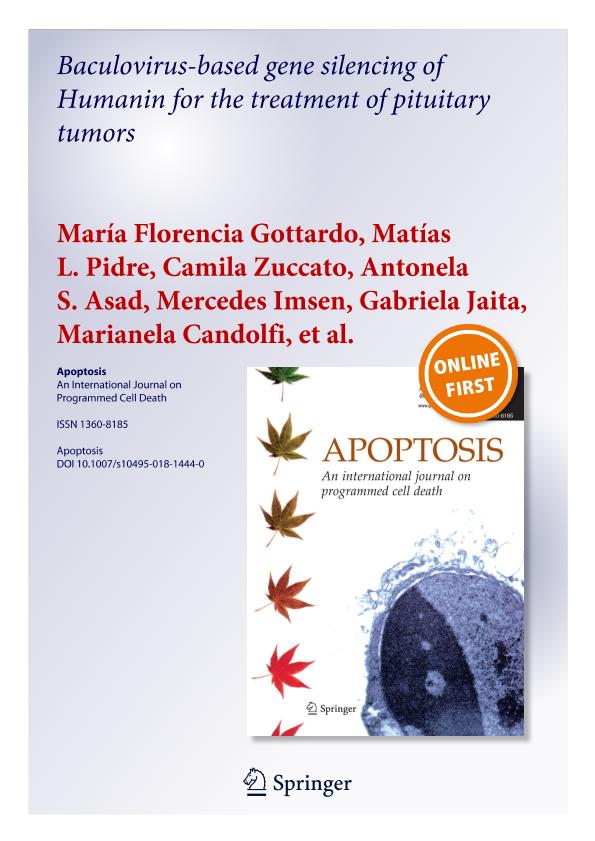Artículo
Baculovirus-based gene silencing of Humanin for the treatment of pituitary tumors
Gottardo, María Florencia ; Pidre, Matias Luis
; Pidre, Matias Luis ; Zuccato, Camila Florencia
; Zuccato, Camila Florencia ; Asad, Antonela Sofía
; Asad, Antonela Sofía ; Imsen, Mercedes
; Imsen, Mercedes ; Jaita, Gabriela Alejandra
; Jaita, Gabriela Alejandra ; Candolfi, Marianela
; Candolfi, Marianela ; Romanowski, Victor
; Romanowski, Victor ; Seilicovich, Adriana
; Seilicovich, Adriana
 ; Pidre, Matias Luis
; Pidre, Matias Luis ; Zuccato, Camila Florencia
; Zuccato, Camila Florencia ; Asad, Antonela Sofía
; Asad, Antonela Sofía ; Imsen, Mercedes
; Imsen, Mercedes ; Jaita, Gabriela Alejandra
; Jaita, Gabriela Alejandra ; Candolfi, Marianela
; Candolfi, Marianela ; Romanowski, Victor
; Romanowski, Victor ; Seilicovich, Adriana
; Seilicovich, Adriana
Fecha de publicación:
02/2018
Editorial:
Springer
Revista:
Apoptosis
ISSN:
1360-8185
Idioma:
Inglés
Tipo de recurso:
Artículo publicado
Clasificación temática:
Resumen
Pituitary tumors are the most common primary intracranial neoplasms. Humanin (HN) and Rattin (HNr), a rat homolog of HN, are short peptides with a cytoprotective action. In the present study, we aimed to evaluate whether endogenous HNr plays an antiapoptotic role in pituitary tumor cells. Thus, we used RNA interference based on short-hairpin RNA (shRNA) targeted to HNr (shHNr). A plasmid including the coding sequences for shHNr and dTomato fluorescent reporter gene was developed (pUC-shHNr). Transfection of somatolactotrope GH3 cells with pUC-shHNr increased apoptosis, suggesting that endogenous HNr plays a cytoprotective role in pituitary tumor cells. In order to evaluate the effect of blockade of endogenous HNr expression in vivo, we constructed a recombinant baculovirus (BV) encoding shHNr (BV-shHNr). In vitro, BV-shRNA was capable of transducing more than 80% of GH3 cells and decreased HNr mRNA. Also, BV-shHNr increased apoptosis in transduced GH3 cells. Intratumor injection of BV-shHNr to nude mice bearing s.c. GH3 tumors increased the number of apoptotic cells, delayed tumor growth and enhanced survival rate, suggesting that endogenous HNr may be involved in pituitary tumor progression. These preclinical data suggests that the silencing of HN expression could have a therapeutic impact on the treatment of pituitary tumors.
Palabras clave:
APOPTOSIS
,
BACULOVIRUS
,
HUMANIN
,
PITUITARY TUMOR
,
RATTIN
,
SHRNA
Archivos asociados
Licencia
Identificadores
Colecciones
Articulos(BIOMED)
Articulos de INSTITUTO DE INVESTIGACIONES BIOMEDICAS
Articulos de INSTITUTO DE INVESTIGACIONES BIOMEDICAS
Articulos(IBBM)
Articulos de INST.DE BIOTECNOLOGIA Y BIOLOGIA MOLECULAR
Articulos de INST.DE BIOTECNOLOGIA Y BIOLOGIA MOLECULAR
Articulos(INBIOMED)
Articulos de INSTITUTO DE INVESTIGACIONES BIOMEDICAS
Articulos de INSTITUTO DE INVESTIGACIONES BIOMEDICAS
Articulos(SEDE CENTRAL)
Articulos de SEDE CENTRAL
Articulos de SEDE CENTRAL
Citación
Gottardo, María Florencia; Pidre, Matias Luis; Zuccato, Camila Florencia; Asad, Antonela Sofía; Imsen, Mercedes; et al.; Baculovirus-based gene silencing of Humanin for the treatment of pituitary tumors; Springer; Apoptosis; 23; 2; 2-2018; 143-151
Compartir
Altmétricas



